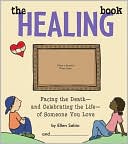
Once a week, I plan on answering one or several letters I receive on a weekly basis. I average about 10 letters a week. I can't always answer each and everyone but I try. I definitely answer those emails that sound desparate. I have gotten letters from widows/widowers telling me they were ready to join their spouse or that they couldn't go on anymore or that no one understood or would even miss them if they were gone. Those letters get answered right away because sometimes these people just need an ear; they just need to know that someone will listen to them.
I will always take out private information and just generalize the question. This letter came from a widow who has a young son that was born after her husband was killed.
"He obviously never got to meet his father, and he is starting to realize that most of the kids he goes to daycare with have both a living mother and father, even if they are divorced. My son has asked me "Where my daddy go?" and I'm not sure how to explain it all to him so that he will understand over time. I currently just tell him "daddy died but he loved you very much" but now he is starting to say "what died mean?" and once again I am at a loss. "
When Jeff died, the kids were 6, 4 and 2. Perhaps it's because I was in this situation when I was six years old and my dad died, but I promised myself to never lie to my children about what happened to their dad, but to put it in a way they can understand. Telling him, "Daddy died, but loved you very much," is fantastic, but if he's questioning what "died" mean it's time for you to give him another level to the conversation. You can tell your son that your husband died in an accident and his body couldn't work anymore and it went to heaven (or whatever fits your faith). Leave it at that and see if he has anymore questions.
However, be careful how you phrase things. You may find out later how the child interpreted it. For example, one thing I've learned is that when someone dies and a doctor is with them, be careful telling the child, "The doctor couldn't fix their body." My son went through a period of time where he didn't like doctors and I finally figured out that he was mad at them for not fixing daddy's body. Some people say, "God wanted daddy/mommy to help him." In this instance, you run into the problem that the children might hold it against God (or whatever fits your faith). So I started to blame the cancer. The cancer took Daddy. You could say, "The 'accident' caused daddy to die." Later, he might want more details, but at this young age, it's okay to just generalize.
I hope I could help.
For older children, you might want to consider, "The Healing Book: Facing the Death – and Celebrating the Life – of Someone You Love," is an interactive book to help children and families express their feelings, ask questions, and explore their memories about a loved one who has passed away. It is an activity book, journal, and conversation-starter that children can make their own and use in whatever way best meets their needs during the grieving and remembering process.
This 64-page, hardcover book has been created so it can be used by any child or family dealing with the death of a loved one. It is a powerful tool in the healing process that opens lines of communication while also creating a scrapbook of memories that can last a lifetime.
I had a chance to email with the author, Ellen Sabin. She wrote, "I wrote The Healing Book for my nieces and nephews the summer my family faces several deaths. I also wrote if for myself. It arose because I simply felt sad and, from the bottom of my heart, missed the people I lost. I needed to feel the loss, express it, and write about it. I also needed to spend time recalling my love, my experiences, and my life with them in it. That's what felt right to me and that's what helped me the most. After my book came out, I learned that it was not only a tool for kids... but one that parents found as an invaluable way to open up conversations with their children; it became something that I realized supported adults as much as it supported children. I hope it serves to support those who find it."
She offers these tips:
* People have all sorts of different feelings when someone they love dies: it is important to let kids know that whatever they are feeling is OK; that they might have a bunch of different feelings; and that what they are feeling is likely to change; sometimes quickly and sometimes not so quickly.
* Inviting your child to ask questions about the topics that confuse them is valuable. They might be scared, confused, or they might want to know about death, the funeral, or other things... encouraging them to talk, journal, or find someone they trust to speak with will help them.
* A wonderful way to support children in grieving is to help them remember the person who died; talking about him or her, or even helping children (who want to) to think about and keep their memories written down.
Until next time, you may be young, but you're not alone,
Lisa

No comments:
Post a Comment